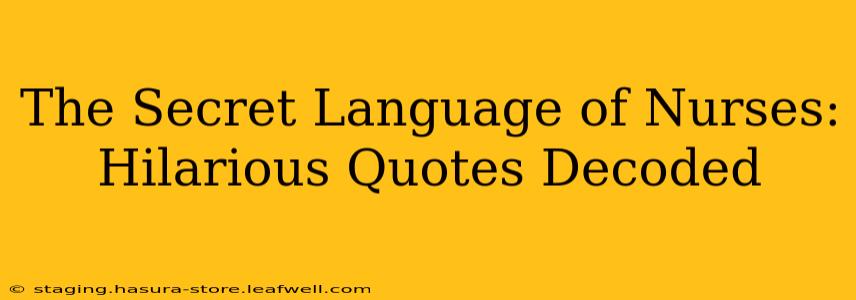Nursing is a demanding profession, requiring incredible skill, empathy, and, often, a healthy dose of humor to navigate the daily challenges. Nurses often develop their own unique shorthand, a secret language filled with inside jokes and coded phrases. This isn't meant to be exclusive; it's a coping mechanism, a way to connect, and often, a way to vent (humorously, of course!). This blog post will decode some of the funniest and most commonly used phrases in the secret language of nurses, providing context and explanations for those outside the profession.
What is the Secret Language of Nurses?
The "secret language" of nurses is more accurately described as a collection of jargon, slang, and inside jokes born out of shared experiences on the job. It's a blend of medical terminology, humorous observations, and clever euphemisms that only those immersed in the nursing world fully understand. These phrases can be used to communicate efficiently, vent frustrations, or simply share a laugh during a hectic shift. It's a tight-knit community forged in the crucible of demanding work.
Common Nurse Phrases and Their Meanings:
Here are some of the most commonly used phrases, explained for the uninitiated:
"Code Brown"
This isn't a medical emergency code in the traditional sense. Instead, "Code Brown" refers to a patient having a bowel accident. It's a polite, and slightly humorous, way of referring to a messy situation that requires immediate attention. The term is used to subtly alert colleagues without causing unnecessary alarm or embarrassment.
"Rapid Response"
While this phrase is technically a medical term, its usage amongst nurses often carries a slightly different connotation. A "rapid response" can signal a patient's condition is worsening, and requires immediate intervention before it becomes a full-blown code. It's a proactive measure to prevent a crisis.
"They're crashing"
This phrase is less about a literal crash and more about a patient's rapidly deteriorating condition. It implies a sudden and significant decline in vital signs, often indicating an urgent need for intervention.
"Hanging fluids"
This doesn't refer to a morbid hobby. In nursing, it refers to the act of administering intravenous fluids to a patient. It's a quick, easily understood phrase used in busy hospital settings.
"Code Purple"
Unlike "Code Brown," a Code Purple is an official designation, but it varies from hospital to hospital. It could represent anything from a missing patient to a security breach or even a bomb threat. The specifics of a Code Purple must be checked within the individual healthcare facility.
"To code"
The term "to code" doesn't refer to writing computer programs. In the nursing world, it's a direct way to describe a patient experiencing cardiac arrest.
"Potty-trained adult"
This is a humorous, yet highly-relevant term. It signifies a patient who is fully capable of managing their own personal hygiene needs without assistance. In a busy ward, differentiating between patients requiring assistance and those who don't is crucial.
Why Do Nurses Use This Language?
The use of this unique language stems from several factors:
- Efficiency: In high-pressure situations, quick and unambiguous communication is vital. Using shortened phrases ensures clarity without unnecessary detail.
- Humor: The profession is demanding. Humor serves as a coping mechanism and a way to bond with colleagues.
- Privacy: Using code allows nurses to discuss sensitive patient information without causing alarm or distress to others nearby.
- Professional Camaraderie: It creates an inside joke and sense of community, uniting staff members through shared experiences.
Beyond the Phrases: The True Essence of Nurse Humor
The secret language of nurses isn't just about specific phrases; it's about the shared experience of navigating challenging situations with wit and resilience. It's a testament to the nurses' ability to find humor amidst chaos, reminding us of their incredible strength and dedication. Understanding this language offers a glimpse into the heart of the nursing profession – a world of constant dedication and profound human connection.

